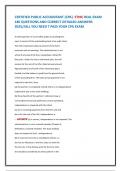Exam (elaborations)
CERTIFIED PUBLIC ACCOUNTANT {CPA} ETHIC REAL EXAM 180 QUESTIONS AND CORRECT DETAILED ANSWERS 2025//ALL YOU NEED T PASS YOUR CPA EXAM
- Course
- Institution
CERTIFIED PUBLIC ACCOUNTANT {CPA} ETHIC REAL EXAM 180 QUESTIONS AND CORRECT DETAILED ANSWERS 2025//ALL YOU NEED T PASS YOUR CPA EXAM CERTIFIED PUBLIC ACCOUNTANT {CPA} ETHIC REAL EXAM 180 QUESTIONS AND CORRECT DETAILED ANSWERS 2025//ALL YOU NEED T PASS YOUR CPA EXAM CERTIFIED PUBLIC ACCOUNTANT...
[Show more]



